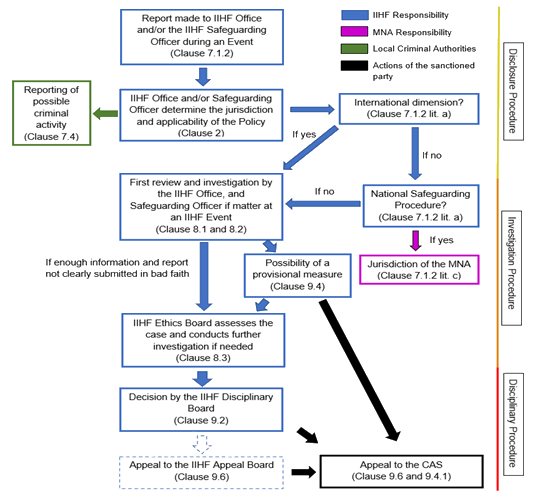Abuse & Harassment
What is Abuse & Harassment?
It is the IIHF’s strong belief that everyone engaged in and around ice hockey has the right to participate in a respectful environment free of abuse and harassment in order to strengthen and promote the game of ice hockey around the world.The IIHF defines Abuse & Harassment as follows:
Psychological abuse – means any unwelcome act including confinement, isolation, verbal assault, humiliation, intimidation, infantilisation, or any other treatment which may diminish the sense of identity, dignity, and self-worth.
Physical abuse – means any deliberate and unwelcome act – such as for example punching, beating, kicking, biting and burning – that causes physical trauma or injury. Such act can also consist of forced or inappropriate physical activity (e.g., age-, or physique- inappropriate training loads; training when injured or in pain), forced alcohol consumption, or forced doping practices.
Racism and discrimination – means any action or attitude, that subordinates or prejudices an individual or group based on race, skin colour, gender, ethnic, national or social origin, religion, philosophical or political opinion, marital status or sexual orientation.
Sexual harassment – means any unwanted and unwelcome conduct of a sexual nature, whether verbal, non-verbal or physical. Sexual harassment can take the form of sexual abuse.
Sexual abuse – means any conduct of a sexual nature, whether non-contact, contact or penetrative, where consent is coerced/manipulated or is not or cannot be given.
Neglect – means the failure of a coach or another person with a duty of care towards the player to provide a minimum level of care to the player, which is causing harm, allowing harm to be caused, or creating an imminent danger of harm.
Mandatory online course for coaches
IIHF introduces mandatory online course for coaches ahead of 2024/2025 World Championship SeasonIn a significant step towards ensuring the safety and well-being of all participants, the International Ice Hockey Federation (IIHF) is launching a new mandatory online course on abuse and harassment for all coaches participating in IIHF World Championships across all divisions, effective from the 2024/2025 season onwards.
The course is designed as an online self-learning module and is accessible HERE.
Fundamental principles
1. Zero toleranceThe IIHF is committed to safeguarding all people engaged in ice hockey and takes a zero tolerance approach to any form of racism, discrimination, bullying, harassment and abuse.
2. Paramountcy
The needs and welfare of victims and other vulnerable groups are paramount, and the IIHF pursues an approach favorable to the welfare of victims, children and other vulnerable groups in all its dealings.
3. Collective responsibility
It is the responsibility of everyone involved in the game of ice hockey to recognize and respond to signs of harassment and abuse.
4. Confidentiality
All Abuse & Harassment cases will always be dealt with strict confidence.
Relevant Rules
The IIHF Abuse & Harassment Regulations can be found here.Reporting
All concerns regarding Abuse & Harassment can at all times be reported to the IIHF on the reporting page.Investigations and Sanctions

Currently suspended
None
